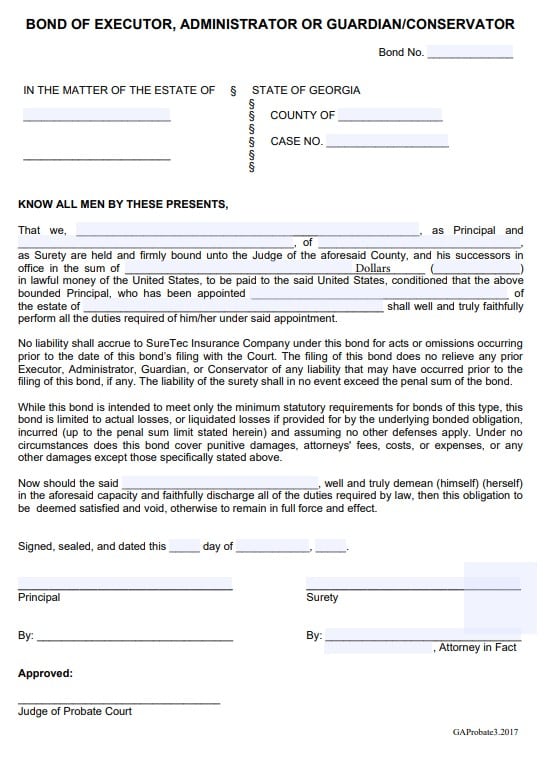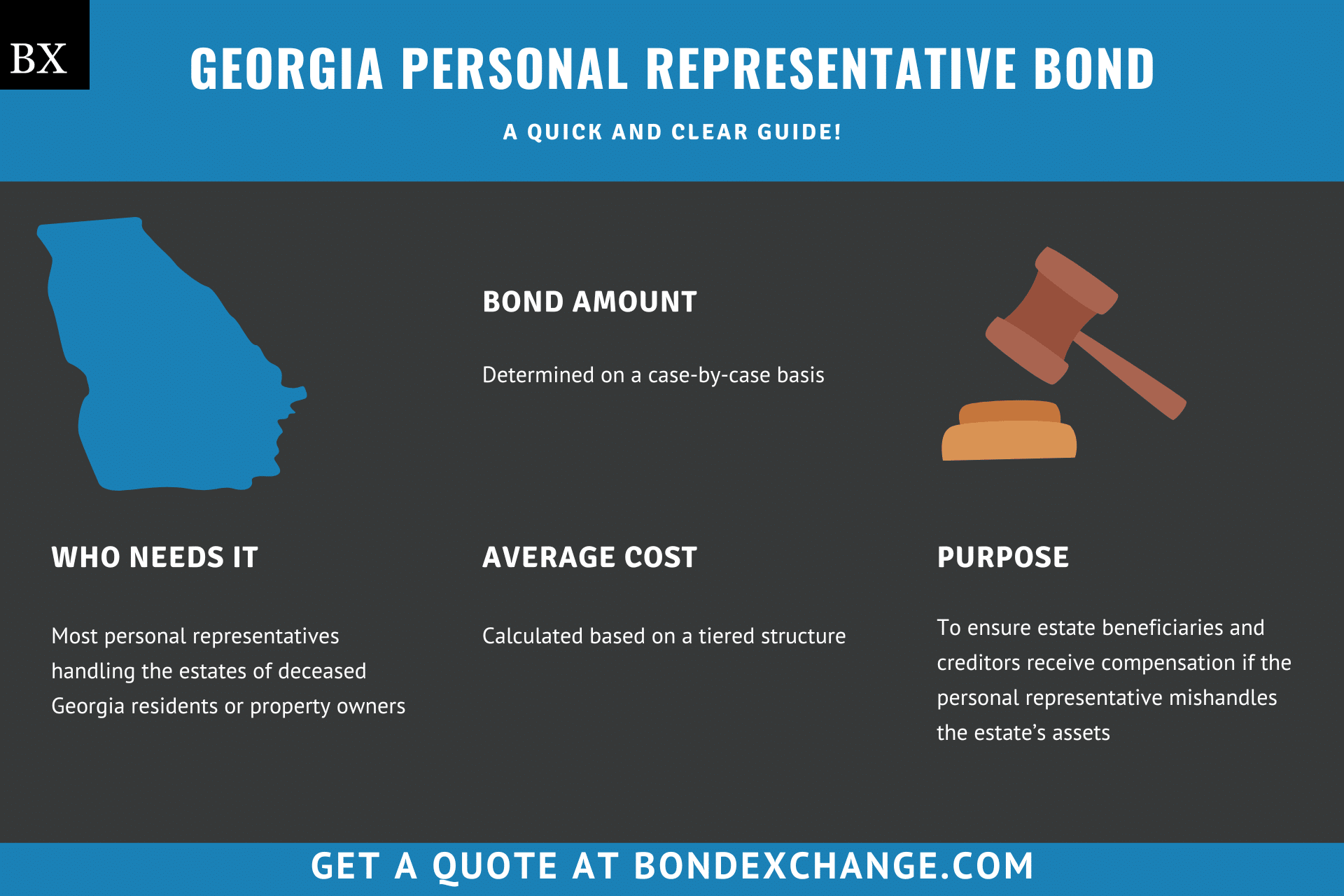Georgia Personal Representative Bond: A Comprehensive Guide
This guide provides information for insurance agents to help their customers obtain a Georgia Personal Representative bond.
At a Glance:
- Average Cost: Calculated based on a tiered structure
- Bond Amount: Determined on a case-by-case basis (more on this later)
- Who Needs it: Certain personal representatives handling the estates of deceased Georgia residents or property owners
- Purpose: To ensure estate beneficiaries and creditors receive compensation if the personal representative mishandles the estate’s assets
- Who Regulates Personal Representatives in Georgia: The probate court of the county with jurisdiction over where the deceased individual resided or had property

Background
Georgia Statute 53-6-10 et seq. requires all personal representatives of an estate to be appointed by a court before assuming their fiduciary duties. The Georgia legislature enacted the appointment requirement to ensure that personal representatives do not mismanage the estate’s assets. To provide financial security for the enforcement of this requirement, the court may require the personal representative to purchase a probate surety bond to be eligible for appointment.
What is the Purpose of the Georgia Personal Representative Bond?
Georgia requires personal representatives to purchase a surety bond as a prerequisite to being appointed as a fiduciary over an estate’s assets. The bond ensures that the estate’s beneficiaries and creditors will receive compensation for financial harm if the personal representative fails to abide by the regulations outlined in Georgia Statute 53-6-51. Specifically, the bond protects beneficiaries and creditors if the personal representative engages in acts of fraud or mismanages the estate’s assets. In short, the bond is a type of insurance that protects the estate’s beneficiaries and creditors if the personal representative violates their fiduciary duties.
How Can an Insurance Agent Obtain a Georgia Personal Representative Surety Bond?
BondExchange makes obtaining a Georgia Personal Representative bond easy. Simply login to your account and use our keyword search to find the “Probate” bond in our database. Don’t have a login? Gain access now and let us help you satisfy your customers’ needs. Our friendly underwriting staff is available by phone (800) 438-1162, email or chat from 7:30 AM to 7:00 PM EST to assist you.
At BondExchange, our 40 years of experience, leading technology, and access to markets ensures that we have the knowledge and resources to provide your clients with fast and friendly service whether obtaining quotes or issuing bonds.
Not an agent? Then let us pair you with one!

Click the above image to find a BX Agent near you
How is the Bond Amount Determined?
Georgia Statute 53-6-50 dictates that the bond amount must be sufficient to cover the estate’s assets the personal representative has possession of and/or decision-making authority over. Additionally, Georgia Statute 53-6-52 states that if the estate’s assets decrease, the court may reduce the bond amount in kind.
What are the Underwriting Requirements for the Georgia Personal Representative Bond?
Most surety companies will examine the following factors when determining eligibility for the Georgia Personal Representative bond:
- Personal representative’s credit history (not considered for bonds with limits less than $25,000)
- Whether or not the estate has an attorney (not considered for bonds with limits less than $25,000)
- How long the fiduciary appointment is for
- Whether or not the personal representative is replacing a prior fiduciary
- If the personal representative has ever committed a felony
- If there are disputes among the estate’s beneficiaries
- Whether or not there is any ongoing business in the estate
- If the bond is being required by a creditor
How Much Does the Georgia Personal Representative Bond Cost?
Surety companies typically determine the premium rate for personal representative bonds based on a tiered structure. As a result, larger bond amounts will be charged a lower premium rate than smaller bonds.
The following table illustrates the pricing structure for the Georgia Personal Representative bond:
$1,500,000 Personal Representative Bond Cost
| Bond Amount | Premium Rate | Total Bond Cost |
|---|---|---|
| First $20,000 | 0.75% | $150 |
| Next $40,000 | 0.60% | $240 |
| Next $140,000 | 0.50% | $700 |
| Next $300,000 | 0.375% | $1,125 |
| Next $1,000,000 | 0.25% | $2,500 |
| Total cost of $4,715 |
Who is Required to Purchase the Georgia Personal Representative Bond?
Georgia requires personal representatives of an intestate (died without a will) estate or temporary administrators to purchase a surety bond as a prerequisite to obtaining a fiduciary appointment. However, personal representatives of intestate estates are not required to purchase a bond if:
- They are a national banking association or bank trust company chartered in Georgia, unless their combined capital, surplus, or undivided profits are less than $400,000
- All heirs agree to waive the bond requirement
Personal representatives of testate (died with a will) estates are only required to purchase a bond if the court believes them to be mismanaging the estate.
To paraphrase Georgia Statute 53-1-2, a personal representative is a court-appointed fiduciary responsible for administering a deceased individual’s estate. Personal representatives are referred to as executors if the deceased individual nominated them in their will (testate), or administrators if they were not nominated if no will exists (intestate).

How do Personal Representatives Become Appointed in Georgia?
Personal representatives in Georgia must navigate several steps to become court-appointed fiduciaries. Below are the general guidelines, but applicants should refer to Georgia’s probate statutes for details on the process.
Step 1 – Meet the Qualifications
To be eligible for appointment, personal representatives must be at least 18 years old and suis juris (in one’s own right).
Step 2 – Determine Priority
Priority to serve as a personal representative shall be granted to any person nominated in the will. If there is no will, then priority is granted to any person unanimously selected by all of the estate’s heirs, unless the sole heir is the surviving spouse that was in the process of getting divorced or separated from the deceased individual. If no person is unanimously selected, the court shall grant priority in the following order:
-
- The surviving spouse (unless they were actively in the process of getting divorced or separating from the deceased individual)
- Any surviving heir or person a majority of the surviving heirs nominate
- Any other eligible person
- Any creditor of the estate
- The county administrator
Step 3 – Hire an Attorney
Although not explicitly required, it is highly recommended that personal representatives hire an attorney to assist with the probate process.
Step 4 – Determine the Probate Type
Georgia allows personal representatives to choose their desired probate type, as outlined below:
-
- Common Form: The personal representative must formally request the court grant them the authority to distribute the estate’s assets. Personal representatives are not required to give notice to beneficiaries or have them appear in court. However, interested persons have up to four years from when the estate is closed to contest the will.
- Solemn Form: All estate beneficiaries must be sent a copy of the will and appear in court for a formal hearing on the will’s validity. The hearing is the only opportunity beneficiaries have to contest the will. However, beneficiaries that prove they did not receive a notification of the hearing may contest the will at any point up to four years from when the estate is closed.
Most personal representatives choose common form probate, as it is the simpler option. However, personal representatives that do not want the possibility of the will being contested for up to four years from when the estate is closed may choose solemn form probate.
Step 5 – Contact the Court
Personal representatives must contact the probate court of the county with jurisdiction over the deceased individual’s estate. A representative of the court will walk the personal representative through the appointment process, provide them with all required forms, and answer any questions they may have.
Step 6 – Purchase a Surety Bond
Unless otherwise exempt, personal representatives must purchase and maintain a surety bond (limits outlined above).
How do Georgia Personal Representatives File Their Bonds?
Personal representatives should submit their completed bond forms, including the power of attorney, to the probate court of the county with jurisdiction over the estate.
The surety bond requires signatures from the company that issues the bond and the personal representative. The surety company should include the following information on the bond form:
- Court where the bond is to be filed
- Name of deceased individual
- Legal name of the entity/individual(s) buying the bond
- Surety company’s name and address
- Bond amount
- Date the bond is signed
What can Georgia Personal Representatives do to Avoid Claims Made Against Their Bonds?
To avoid claims against their bonds, personal representatives in Georgia must ensure that they:
- Do not engage in any acts of fraud
- Do not mismanage the estate’s assets
- Fulfill their fiduciary duties
